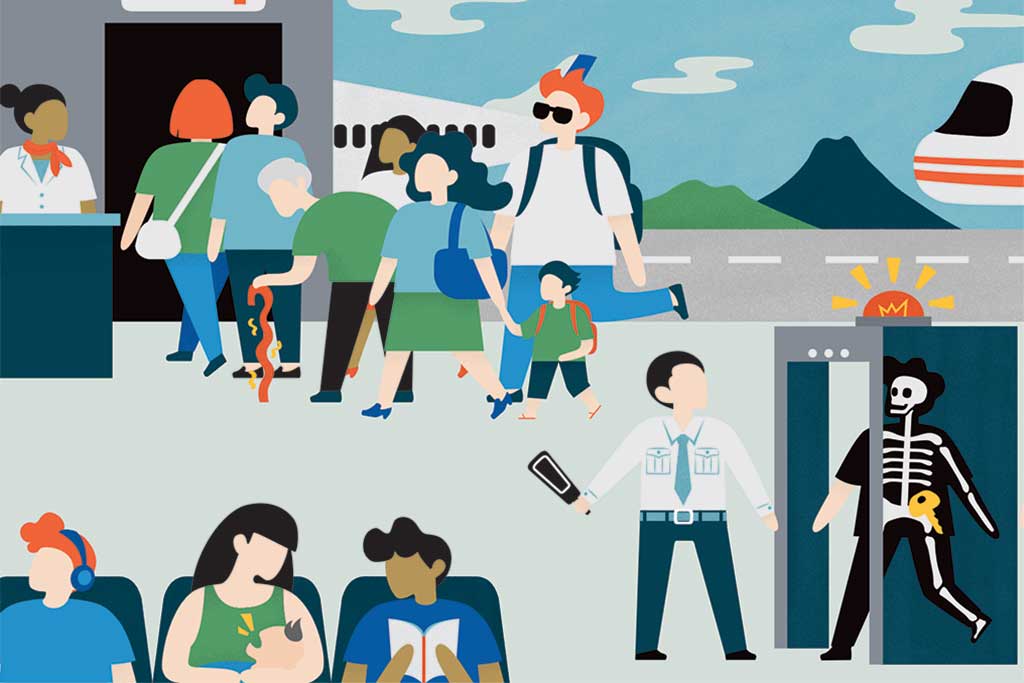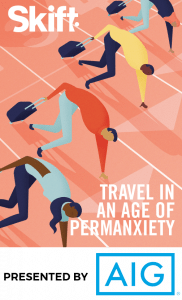Skift Take
You can argue it's never been a better time to fly. Fares are cheap, and amenities like Wi-Fi and free snacks keep improving. Even better, airlines are updating their mobile apps, making it easier for passengers to rebook from delayed or canceled flights. But some people — at times, frequent flyers but mostly the infrequent ones — still view flying as a pain.
Skift launched the latest edition of our magazine, Travel in an Age of Permanxiety, at Skift Global Forum in New York City in September. This article is part of our look into the current state of the traveler mindset through the lens of the pervasive state of anxiety felt worldwide.
Download the full version of Skift’s Travel in an Age of Permanxiety magazine here.
Perhaps since the first commercial flight, passengers have felt stressed on airplanes. But before the early 2000s, it was easier to identify causes. Some travelers feared plane crashes while others worried about terrorism. Some may have suspected they would have a panic attack, perhaps because they didn’t like cramped spaces.
Now, passengers have more to fear. Many have extensive worries — from buying a ticket (why do prices fluctuate so much?) to checking in (will the airline charge for bags?), security (will they receive an invasive pat-down?), boarding (will the overhead bins have enough space?), and seating (will there be enough legroom?).
It means that, even as carriers invest in passenger-friendly amenities, including Wi-Fi and better entertainment, and improve their on-time performance, many customers say they’re stressed and anxious. Some have similar problems in daily life, but many more navigate other tasks fine. They just dislike flying.
It makes sense. Security checks are more arduous now than a couple of decades ago, and many passengers don’t know what they can bring with them. Meanwhile, many travelers dislike how many airlines treat passengers differently. On most carriers, loyal customers receive special perks, while everyone else pays for stuff that was once free, including checked luggage, assigned seats, and, in some cases, carry-on bags. That approach makes sound business sense, but it often makes frugal passengers anxious.
“The process of getting into the airport and onto the plane is typically associated as a stressful experience and not a pleasurable experience,” said Emanuel Maidenberg, clinical professor of psychiatry and biobehavioral sciences at UCLA’s David Geffen School of Medicine. “These kinds of worries, although they are perfectly fine and normal, they tend to lead to elevated levels of baseline stress.”
There are evolutionary reasons for this anxiety, said Jenni Blackford, an associate professor of psychiatry and behavioral sciences at Vanderbilt University Medical Center. Humans, she said, do not like uncertainty. And at airports and on planes, many do not know what to expect. More than ever, they don’t feel in control.
“Even though traveling is relatively safe, our brains are still wired to pick up on potential threats,” Blackford said. “These days, where it’s pretty safe, things that are uncertain or ambiguous can cause the same sense of fear that a sabre-toothed tiger would have caused in the past. Somebody who may have a high need for control might worry that their bags are going to get lost and they won’t have their favorite sunscreen.”
(Un)Welcome Security
One newish problem is security checks. Even seasoned travelers do not always know what to expect, and many passengers fear they could receive a random — and invasive — pat-down, said Jeff Price, an expert on airport security and professor at Metropolitan State University in Denver.
Price knows extra checks are necessary, but he recently watched officers perform a secondary screening on his wife — she set off the alarm after handling household cleaning supplies — and he said he understood why people find it uncomfortable. “That person touched my breasts,” his wife told him afterward.
“If you are never encountered by law enforcement for anything more than a speeding ticket, there is really no other place in our society where you are going to be patted down like that except at the airport,” Price said. (Pat-downs at concerts and sporting events are usually less invasive, he said.)
The Airline Problem
Almost two decades ago, David Neeleman founded JetBlue Airways with a simple idea: bringing humanity back to air travel. His airline offered more legroom and free TV, didn’t overbook flights, and served snacks to everyone, even during less profitable times.
In the 17 years since its first flight, JetBlue has made some missteps, and one — its inability to recover following a 2007 Northeast snowstorm — cost Neeleman his job. And, yes, JetBlue has tweaked its model, reducing legroom and charging some customers for checked bags. But the founder’s ethos remains important, a major reason JetBlue strives to treat passengers respectfully.
JetBlue often focuses on simple stuff. It refers to travelers as customers rather than passengers. Its employees are crew members, so no one focuses on job titles or roles. And the airline calls its economy class cabin Core instead of coach. The airline’s premium section, meanwhile, is Mint — not first class. Using words, it wants to remind passengers and employees they’re all in it together — that no one is better than anyone else.
“Air travel can be really stressful,” Joanna Geraghty, JetBlue’s executive vice president for customer service, said in a recent interview. “We have all been there. When I travel with my family, the stress level rises. We try to create an environment where our crew members are empathetic to our customers.”
It’s an interesting approach, and judging by airline-industry awards, JetBlue probably creates more goodwill than any competitors other than Southwest Airlines and Alaska Airlines, both of which have similar philosophies.
Unequal “Rights”
But not all airlines follow the egalitarian model. Many reward premium customers with perks, but charge frugal passengers for nearly everything. This is not new, but the chasm has widened as carriers have prioritized high-value customers more than before. (JetBlue also rewards loyal customers, but not as extensively as other airlines.)
On many larger airlines, loyal customers check bags for free and receive upgrades to first class and premium economy. While flying in economy, they have first choice of seats, so they can usually sit with their families. When flights are delayed or canceled, they’re the first to be rebooked. And on some flights, they get free meals and alcohol, when others do not.
Still, on most airlines, boarding is probably the biggest issue for causing stress. Generally, loyal customers get on first, allowing them to place bags in overhead bins before less profitable passengers board. By the time “regular” passengers board, there’s often little room.
“One of the things [humans] want is to be the first person to secure resources,” Vanderbilt’s Blackford said. “The one with the most toys wins. If you are worried about a shortage of resources, which you often are for overhead bin space, you end up getting this crowd mob mentality.”
For non-elite flyers, “It’s just like being in a cage,” said Sarah Steegar, a 19-year flight attendant at a major U.S. airline, who tweets at @FATravelWriter. “You’re so limited and at the mercy of other people to help you — and getting such help is harder and harder because airline employees are stretched as well for resources and manpower. More and more, it’s a bit of an ‘every man for himself’ environment.”
Most flyers are well-behaved, Steegar said, but about two percent “cause some sort of drama” — though not all do so intentionally. She noted her employer has not taught her how to handle anxious passengers since her initial training two decades ago, though the airline trains flight attendants on how to respond to passengers who pose a security threat.
“I’ve seen colleagues punched, I’ve been cursed at, I’ve had weird threats,” Steegar said. “People try it all on with us, and it got worse after the United incident (with the doctor dragged off the plane) where belligerence spiked and people seemed like they really wanted a confrontation.”
The Daily Newsletter
Our daily coverage of the global travel industry. Written by editors and analysts from across Skift’s brands.
Have a confidential tip for Skift? Get in touch
Tags: airline innovation, airline passenger experience, permanxiety, sgf2017, skift global forum
Photo credit: It seems that flyers have more to fear these days than in the past. Bing Qing Ye / Skift

